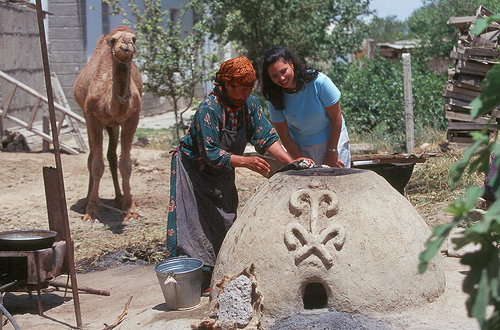The United States Embassy in Ashgabat announced [1] recently that the Peace Corps [2] – a US government-run volunteer program – would close its programs in Turkmenistan and leave the country by the end of 2012. The August 31 announcement reads:
Since 1993, more than 740 health and English-language teacher volunteers have lived and worked in every region of Turkmenistan. Peace Corps considers its program to have been extraordinarily successful in terms of achieving its development and cultural exchange goals. Currently, there are 18 serving volunteers in Turkmenistan. They will complete their service in September and the Peace Corps administrative office in Ashgabat will close in December.
Limited education opportunities
 [3]
[3]A Peace Corps Volunteer shares a meal with her community members in Turkmenistan. Image uploaded by Flickr user Peace Corps on October 31, 2007 (U.S. Government Work License)
The author contacted several Turkmen students studying abroad to ask what they thought about Peace Corps operations in Turkmenistan. Most of these students said that the Peace Corps volunteers used to run community development projects, summer camps and English language clubs.
Through this engagement, the volunteers encouraged many Turkmen students to apply for scholarships to study abroad, thus offering them a rare window to the outside world. In addition, the volunteers opened NGOs outside Turkmenistan to work with Turkmen students and continued to contribute to community development projects even after leaving the country.
One of the Turkmen students at the American University in Bulgaria, who asked not to disclose her name, said [ru]:
когда я училась в школе я и не мечтала о том, чтобы учиться за границей. но волнтер корпуса мира поддержал меня, вдохновил изучать английский и подать документы на учебу. я смогла поступить в колледж только через 4 года после того как окончила школу, но все же у меня получилось. он помог мне найти стипендию и подать заявление. но самое главное, это то, что он изменил мой взгляд на мир и мое отношение к тому, что творится вокруг
The Peace Corps’ withdrawal is yet another development aimed at limiting foreign education opportunities for Turkmen students. Other U.S. government-funded programs such as Future Leaders Exchange Program [4] (FLEX) and Global Undergraduate Exchange Program [5] (UGRAD) have also been restricted in Turkmenistan, effectively leaving the Caspian state cut off from global educational networks.
“Foreign agents” or useful service providers?
The announcement of the Peace Corps’ imminent closure triggered a discussion among Turkmen internet user about the role played by the program's volunteers. Some netizens opine that the volunteers are “agents” of the U.S. government. Writing on the Turkmen Chronicles, Tushkan announced [6] [ru]:
Давно пора было выгнать из Туркменистана эту ячейку ЦРУ с её «скаутами-волонтёрами».
Other comments indicate that this view is far from being dominant. Adalat Seeker responded [7] [ru]:
Балбес ты, тушкан, и лузер. Волонтеры принесли огромную пользу Туркменистану, молодежи, учителям и врачам.
Mary added [8] [ru]:
Огромная польза была от Американцев..народ Туркменский просвещали. Вот их и бояться…
And Merdan chimed in [9] [ru]:
тушкан, в туркменистане у цру есть другие, гораздо влиятельнее и информирований источники получения информации чем волантеры корпуса мира, твое умозаклюние полный абсурд …
Within Turkmenistan which remains one of the most isolated countries of the world, many people remain highly suspicious of the role of foreign volunteers in their communities. [Read Global Voices September 21, 2011 post for more background [10]].
Lasting legacy
 [11]
[11]Peace Corps volunteer learning to use the clay pot for cooking with a Turkmen woman.Image uploaded by Flickr user Peace Corps on October 31, 2007 (U.S. Government Work License)
Following the announcement of the program's withdrawal, neither the government of Turkmenistan nor the U.S. embassy offered any explanation. In fact, the Peace Corps’ problems in Turkmenistan are not new. Already last year, its volunteers had problems [12] extending their visas. In neighboring Kazakhstan, the program also had to close [13] in 2011.
Despite the imminent departure, the Peace Corps seems to have left a lasting cultural legacy in the country. As Maya Saryeva recalls [14] in a backdated post on the Friends of Turkmenistan blog:
I still remember the feeling of anxiousness and excitement that I felt when I exchanged my first English words with a PCV named Matthew. In that sense, I think Peace Corps Volunteers help Turkmen youth the most, in providing them with an opportunity to better their English and offer them a window into a world of real knowledge about United States. Undoubtedly, many PCVs bring a positive contribution to the lives of young student participants who get to enjoy taking part in summer camps or other educational activities organized by PCV. If Peace Corps ceased to exist in Turkmenistan, the majority of the population will probably never notice, however the youth will lack that personal interaction with a person from a different part of the world, and many kids will never get to experience the feelings I felt when I first had to speak to a Peace Corps Volunteer at the age of nine.